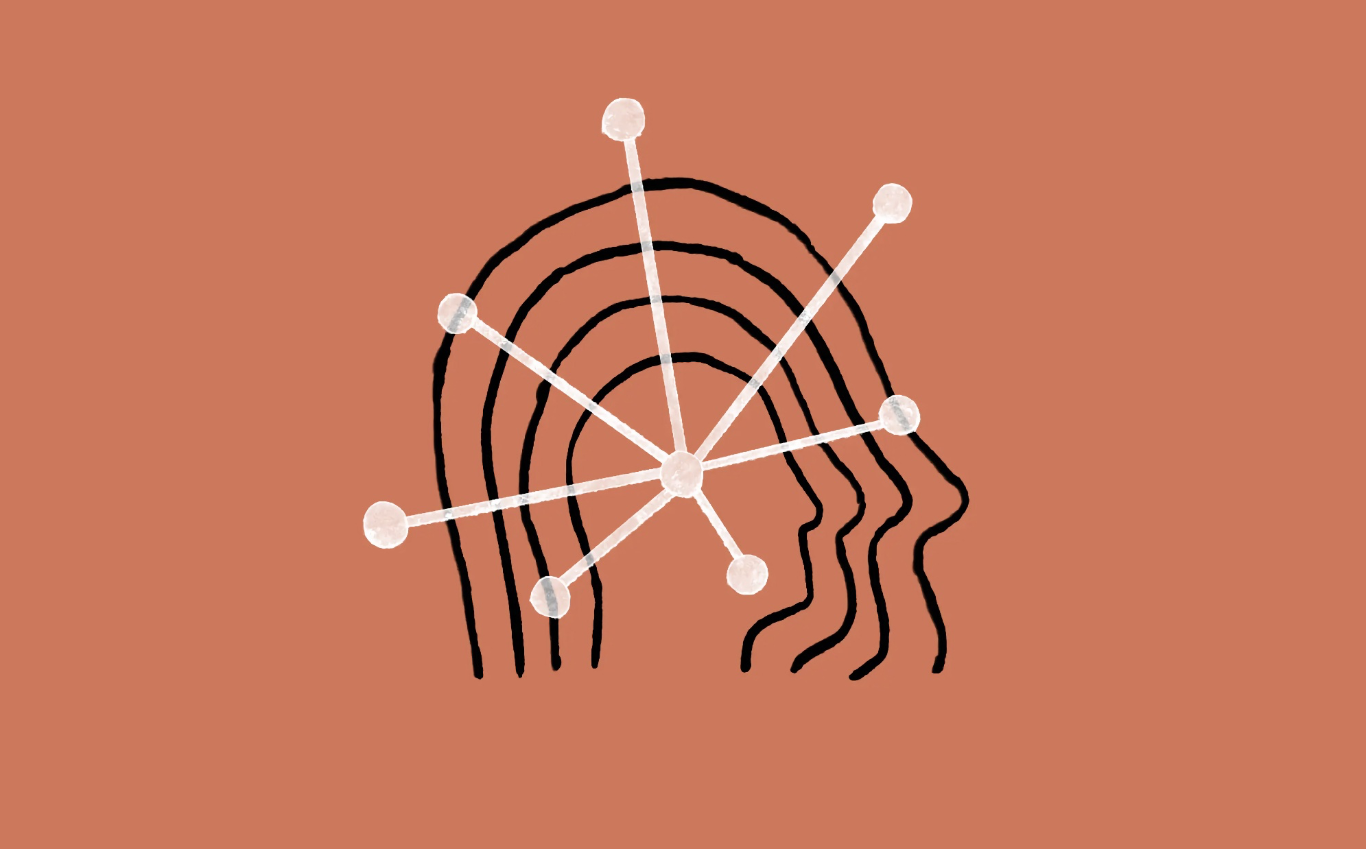The Tech Giants’ Battle of X Digital Identity, Payments, Social Graph, AI, and Universal Basic Income (UBI)
Tech giants battle for digital identity, payments, social graph, AI, and UBI.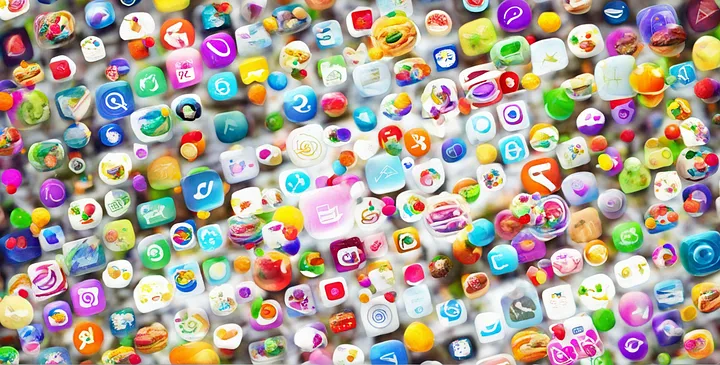
Tech giants are engaged in a high-stakes battle to create dominant “everything apps” that combine digital identity, messaging, payments, and AI services. The winner of this race stands to gain unprecedented data to power their AI platforms and shape the future of society.
Implementing Universal Basic Income (UBI) through these super apps is a mechanism to address the downside risks of technological disruption in an era of accelerating automation and AI proliferation. Whether these promises can be fulfilled, whether they can bring about greater equality, whether they are sufficiently decentralized to distribute power to all of humanity, or whether they can be achieved in time before automation disruption, these are at least worth paying attention to.
The main participants in this competition are:
- After a massive layoff of 73%, can Star Atlas, a 3A masterpiece born in a bull market, still be launched as scheduled?
- After LSDFi, will the liquidity provided by derivative LPDFi trigger the next wave of DeFi narrative?
- Bybit Payroll Manager Steals Large Amounts of USDT, Singapore Court Elaborates on Cryptocurrency Property Attributes
Wordcoin
——Enabling digital identity, on-chain financial freedom, and UBI through “The Orb”
Worldcoin is an ambitious cryptocurrency project that recently launched on the Optimism Mainnet with the goal of creating a global identity system and distributing digital currency to every person on Earth. Its aim is to use zero-knowledge (ZK) proofs to distribute tokens and payments to everyone on Earth while protecting privacy. Backed by former Y Combinator president Sam Altman and physicist Alex Blania, Worldcoin aims to attract billions of users to its platform and ultimately provide Universal Basic Income in the form of tokens with a maximum supply of 10 billion to prepare for the arrival of AI.
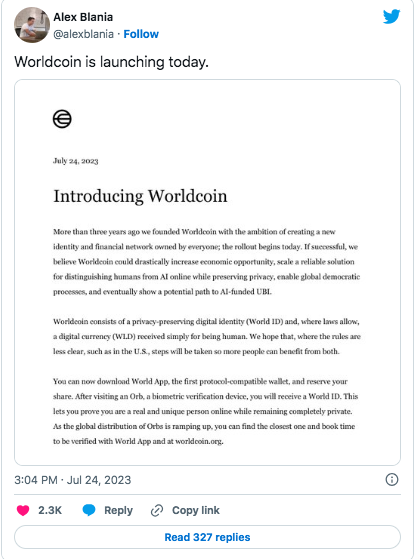
The core innovation of Worldcoin is the use of iris scanning to generate a unique cryptographic identity for each individual. People can scan their irises by gazing into Worldcoin’s “Orb” device, which uses advanced biometric technology to map the iris. This biometric data is stored only on the device, not in the system – only encrypted proofs protecting the privacy of the unique identity are recorded in Worldcoin’s system.
According to the Worldcoin team, iris scanning provides the highest entropy and uniqueness compared to other biometric technologies like fingerprints or facial recognition. This allows Worldcoin to provide strong cryptographic proofs that every identity on their system is associated with a real human being.

The goal is to make Worldcoin an open protocol that anyone can use to verify their identity without permission. Identities registered through Worldcoin can then be used in many applications – login services, additional credentials, receiving allocations of Universal Basic Income, and more.
Worldcoin faces scrutiny and criticism in terms of privacy and the ethics of a biometric identity system. The company emphasizes that biometric data exists only on the “Orb” device and the system uses ZK encryption to protect privacy. However, some remain skeptical of potential risks.
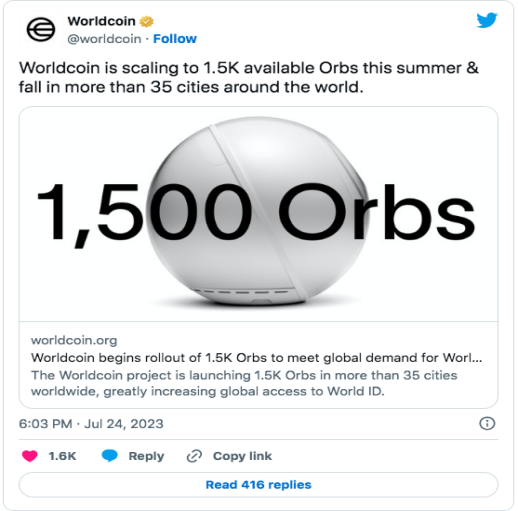
So far, Worldcoin has registered over 2 million identities and launched its token distribution and identity platform. With the support of Sam Altman and other prominent investors, Worldcoin aims to attract billions of people to participate and create a universally accessible global identity and economic system.

X – All Applications
Elon Musk has ambitious plans for X (previously known as Twitter). His goal is to make X the center of a comprehensive ecosystem and eventually merge his other companies such as x.AI, Tesla, Neuralink, SLianGuaiceX, and The Boring ComLianGuainy.
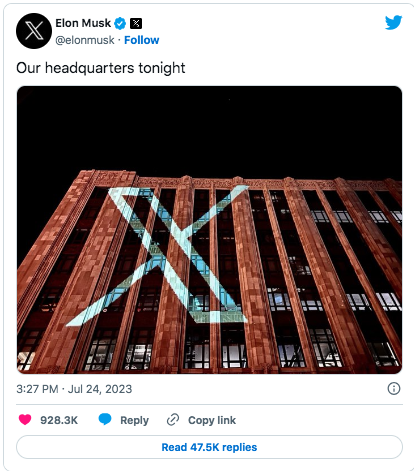
Musk envisions linking user identities from different platforms together so that users can seamlessly use his products and services. X will become the gateway and universal control panel of Musk’s empire.
You can drive a Tesla and livestream the view from the cockpit on X in real-time. Travel from downtown to the airport via The Boring ComLianGuainy’s super loop tunnel and share the journey on X in real-time. Chat with an AI assistant supported by Neuralink on X to get answers and advice for daily activities.
Access global satellite internet through X, and SLianGuaiceX missions can also become interactive shows on X. Millions of viewers watch every detail of rocket launches. Fans vote for payloads, conspiracy theorists analyze camera footage, space enthusiasts interact, and all of this happens on the X platform.
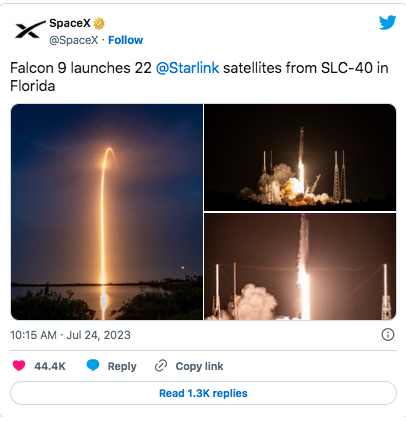
Integrate technology and entertainment into non-stop spectacles. The most important moments of Musk’s companies are synchronously livestreamed to the entire audience on X, with a countdown for each milestone.

To connect his brands in this way, Musk needs comprehensive vertical integration and user lock-in. It requires real identities, eliminating anonymity, linking accounts, built-in payments and subscriptions. X will be the cornerstone of your digital presence, including enabling your AI agents to handle daily tasks through xAI and Tesla’s Optimus robot.
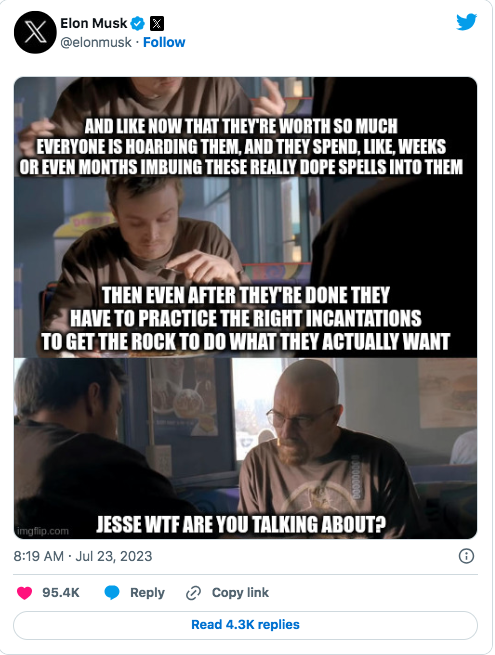
Of course, building this digital kingdom faces countless challenges. But Musk has the ambition and disregard for tradition necessary to pursue this goal. Whether good or bad, his X will soon become the gateway for you to experience, discuss, and pay for all aspects of life.
Meta
——Facebook, Instagram, Whatsapp, Threads, Quest
Facebook’s parent company has renamed itself Meta, focusing on the metaverse, a futuristic sci-fi vision from Neil Stephenson’s Snow Crash, driven by artificial intelligence, blockchain, and XR (virtual, augmented, and mixed reality technologies). Meta is driving digital identity through accounts and plans to integrate messaging, commerce, and XR experiences. It also has a leading AI lab and billions of data points.
Meta has grand ambitions to become an application that allows you to do everything online. By combining social connections, messaging, commerce, work tools, and more in virtual reality, Meta aims to build the first true “metaverse.”

This vision began with Facebook itself. With nearly 3 billion monthly users, Facebook has become the identity and community center for most parts of the world. Now, Meta is committed to integrating messaging, payments, marketplace functionality, and virtual reality directly into the Facebook experience.
Meta’s acquisitions of WhatsApp and Instagram have made them two large platforms with over 2 billion users. It is estimated that 3.8 billion users use at least one Meta app. Combining messaging and shopping features in its app lineup can create a sticky and interconnected ecosystem. In addition, Meta’s Threads aims to challenge the field of X (formerly Twitter).
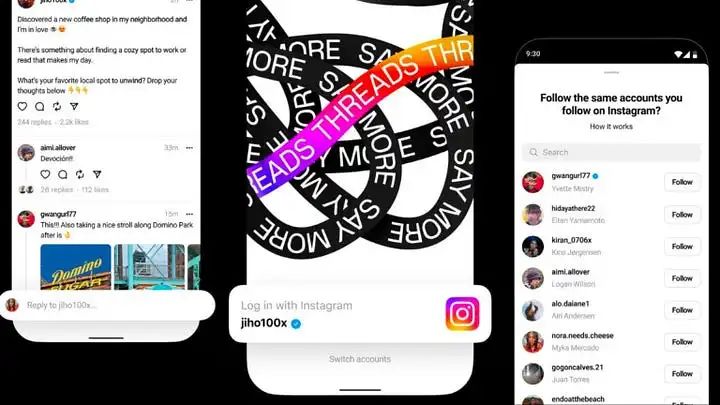
Meta Horizons and Horizon Workrooms indicate the company’s productivity and collaboration goals in XR. Meta is betting on augmented reality to be the next frontier for social connections and business. It sees an opportunity to lead in building XR equivalent tools like Zoom and Slack.
Critics believe that Meta’s vision of the metaverse is still distant and faces significant obstacles. The company also continues to face regulatory scrutiny over its market power and data privacy practices. Meta focuses on owning the infrastructure layer of the metaverse, which conflicts with a more decentralized, user-owned vision of the future.
However, with billions of users and top-notch internal AI researchers, Meta has powerful resources to iterate and achieve its goal of immersive fusion of digital experiences. If Meta successfully becomes the “everything app” for work, entertainment, and social life in the metaverse, it will solidify its position as one of the most influential companies in the tech industry.
——Everything in China
In China, a single application dominates daily life. WeChat, owned by tech giant Tencent, has become an indispensable platform that combines messaging, payments, transportation, news, and countless other services.
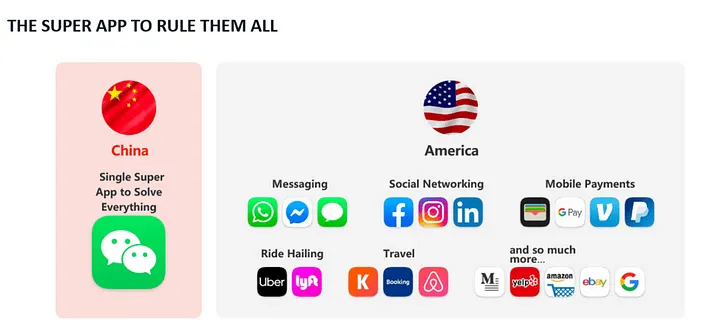
WeChat has over 1.2 billion monthly active users and is one of the largest “super apps” in the world. The core of WeChat is messaging, but it goes far beyond just chatting with friends. WeChat users can hail a taxi, order food delivery, make doctor appointments, check bank statements, book vacations, and even apply for divorce—all without leaving the app.
The app has also become a payment giant. WeChat Pay, built into the platform, is the most popular mobile payment method in China. Users can send money, pay bills, shop in stores, and pay for everything from dining to groceries through WeChat. The app’s “red packet” feature, which allows users to send digital cash gifts, has become a cultural phenomenon.

WeChat’s ubiquity and functionality have created a closed ecosystem that consumes an increasing number of people’s digital lives. Users increasingly exist in the WeChat world rather than directly on the broader internet. The app is described as a “digital gateway to China”—a mandatory entry point connecting with billions of citizens.
However, WeChat’s dominance has raised concerns. As a centralized proprietary platform, it deviates from the open spirit of the internet. Its payment department has also become a target of Chinese regulatory authorities due to antitrust issues.
Nevertheless, WeChat still provides a compelling case study for integrating super apps that can meet users’ communication, business, and convenience needs in a single interface. Tencent continues to work on expanding WeChat’s functionalities, making it even more indispensable in daily life in China.
Apple
——The Platform for Everything
Thanks to the popularity of the iPhone and Apple’s integrated ecosystem, the company is ready to deliver the “everything app” experience.
Apple’s iMessage, FaceTime, Apple Pay, Wallet, and iCloud services already allow users to communicate, shop, store identification documents, and more through their iPhones. With over 1 billion people worldwide using iPhones, Apple has a large built-in user base.
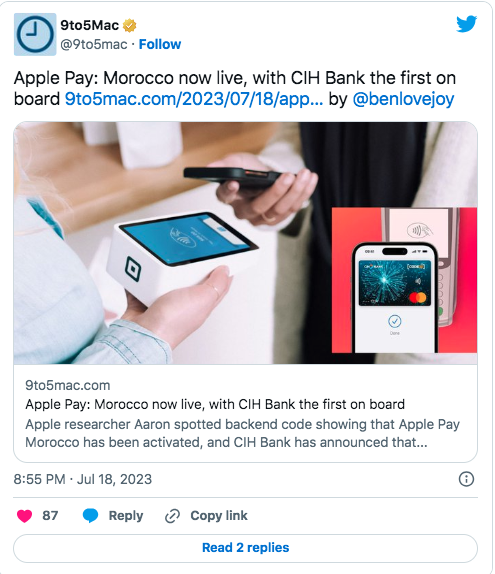
Compared to ad-driven platforms like Facebook, the company’s focus on privacy also puts it in a favorable position. Apple has long advocated for protecting user data rather than monetizing it.
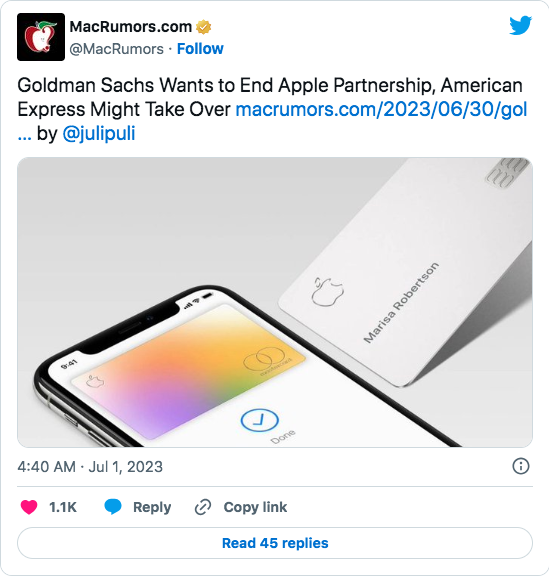
However, Apple still faces challenges in transforming its applications and services into truly integrated super apps. Most of its products remain isolated rather than seamlessly interconnected.

Apple lags behind competitors in emerging fields such as augmented reality and virtual reality, but is seeking to catch up with the Apple Vision Pro series (which also uses iris scanning for identification, challenging Worldcoin’s Orb).

Nevertheless, Apple still holds a potential gold mine with its services closely related to people’s daily habits, including communication, payment, and entertainment. If Apple opens up and interconnected its ecosystem, it can build an all-in-one application centered around individuals rather than advertisers.
Apple’s goal is not a closed platform, but an open and user-centered hub that focuses on simplicity, privacy, and security. The result may not be as all-encompassing as WeChat, but Apple has the technology and trust to create a remarkable all-in-one application dedicated to serving individuals.
What does success look like?
Companies that succeed in this universal app race can leverage data from billions of digital records and activities to rapidly advance the development of artificial intelligence. They may gain access to universal basic income and shape the ability of online identity and commerce.
However, concerns about privacy, manipulation, bias, and concentration of power in artificial intelligence systems are abundant. Many critics argue that these ambitions should be checked through regulation and decentralization of power. But tech giants are pushing forward, hoping to dominate the next era of the internet. Their actions can change society, for better or worse.
The case for universal basic income
As we find ourselves in the midst of the fourth industrial revolution, technological advancements are not only gradually changing our lives and work, but also reshaping entire industries, creating a growing sense of urgency to reevaluate our economic paradigm. One proposal that is gaining attention is UBI. But what is UBI? Why do we need it now more than ever?
Universal basic income is an economic model in which all citizens of a country receive a regular, livable, and unconditional sum of money from the government or other public institutions, regardless of their employment status or wealth. Universality is the defining characteristic of universal basic income, distinguishing it from means-tested welfare programs or conditional social transfers.
The need for universal basic income is a response to contemporary challenges:
1. Automation and job displacement:
The progress of artificial intelligence, robotics, and automation is changing the job market in unprecedented ways. Many tasks that were previously performed by humans are now being carried out more efficiently by machines. While this shift improves productivity, it also has the potential to lead to a significant loss of jobs.
It is not just blue-collar jobs that are at risk; white-collar jobs are also under threat. Complex algorithms can now perform tasks ranging from data analysis to disease diagnosis, and many jobs that were once considered secure are being eliminated.
Universal basic income can serve as a buffer against these economic shocks, providing a safety net for unemployed workers to undergo retraining or seek new employment opportunities in a rapidly changing job market.
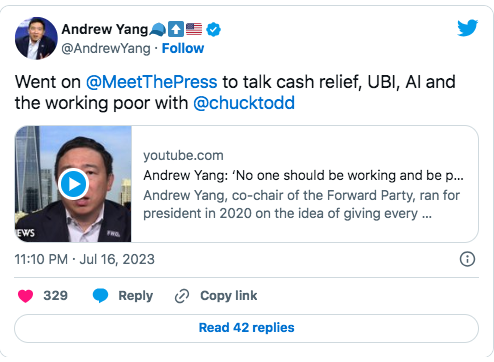
2. Alleviating poverty and inequality:
Income inequality and poverty are major challenges faced by many societies today. Universal basic income can be a powerful tool in reducing poverty and ensuring a more equitable distribution of wealth. It ensures that every citizen has access to a basic income, promoting social fairness and preventing the exacerbation of poverty.
Universal basic income can supplement the income of those who earn less than a living wage, providing a certain level of financial security and alleviating the pressures associated with financial instability.
3. Encouraging entrepreneurship and innovation:
The fear of financial insecurity often hinders individuals from pursuing entrepreneurship or creative pursuits. With a guaranteed income, people have the ability to take calculated risks, explore new ideas, and dedicate time to innovation. In this sense, universal basic income can create an environment conducive to entrepreneurial and creative industries, driving economic growth and social progress.
4. Addressing unpaid work:
A large amount of work carried out in our society, such as caregiving, raising children, and volunteer work, goes unrecognized and uncompensated. Universal basic income can help address this issue by providing a basic income that acknowledges these fundamental contributions, which often fall outside the scope of traditional economic frameworks.
Summary of UBI
Critics argue that universal basic income may discourage work motivation, but research has refuted this claim. Pilot projects in countries such as Finland, Canada, and Kenya have shown that people generally continue to work after receiving basic income. UBI does not foster laziness; instead, it helps achieve a better balance between work and life and enhances the ability to pursue fulfilling work.
Universal basic income is not a panacea for all economic challenges. However, it represents a paradigm shift towards a more human-centered economy. In an era of rapid technological advancement and increasing inequality, universal basic income can provide the necessary stability and security for individual and societal prosperity. This is more than just a policy suggestion; it is an investment in humanity. We need universal basic income because we need to redefine economic success in the 21st century – success that includes everyone.
We will continue to update Blocking; if you have any questions or suggestions, please contact us!
Was this article helpful?
93 out of 132 found this helpful
Related articles
- Binance Chain L2 pioneering application MEKE to start public testing on July 31st
- Involved in a transaction of 400 billion yuan, how do law enforcement agencies dispose of confiscated cryptocurrencies?
- How will the five market makers improve the liquidity of WLD compared to Zero as a market maker for PEPE?
- Analyzing UNI Long-tail Liquidity Scenarios How Does it Work?
- African Gold Rush I Help Chinese People with Worldcoin KYC, Earning Up to 20,000 RMB per Day
- Is the concern about Worldcoin groundless?
- Conversation with LianGuai Founder Pan Zhixiong How do Buidlers work?




